MOULADING BUSINESSES
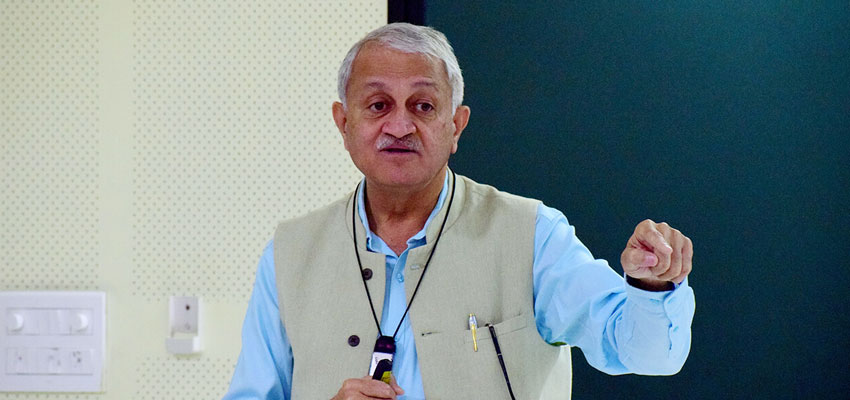
Ram Bhogale, Chairman, Bhogale Automotive Pvt Ltd, and heading a clutch of businesses under the umbrella of Applied Innovation and Technology Group, widely known for the pioneering product of its time-Nirlep non-stick cookware-now sold to Bajaj Electricals-is a leading industrialist from Aurangabad in the auto components sector. An industry leader and philanthropist, actively involved in education, cooperative banking and agriculture mechanisation, his group business now extends beyond auto components to heavy engineering machinery to innovative solutions in agriculture. He speaks at length about the Group’s journey through the headwinds and tailwinds of a buffeting market and spells out the factors that helped as well as stunted the growth of Aurangabad as a manufacturing hub
"In 1976, westruggled to make about 100 pans a day. By the time we finished developing technologies, we used to make almost 1,50,000 pans a month"
-Ram Bhogale
CORPORATE CITIZEN: Tell us a bit about your career starting from college onwards.
Ram Bhogale: I completed my Mechanical Engineering from Government College of Engineering, Aurangabad in 1976. Although I was not a very bright academic student, I participated in all extra-curricular activities in the college including contesting elections of the students’ council. I used to represent my college in badminton and the university in cricket. I was selected for basketball and tennis too but had no time for them. I participated in debate and drama competitions and won several awards.
I started my career in my father’s accessory unit making hospital equipment in 1976 which is now with my uncle. This was my father’s first company before he launched Nirlep, the non-stick cookware unit. Unfortunately, my father was detected with cancer, so I started working in Nirlep as it was a fast-growing business. From that day in 1977 until 1997, I worked in the non-stick cookware business. In 1995, we realised it would face stiff competition because of liberalisation and the opening up of markets. We began working on starting a new business with whatever key skills we had developed—we had worked with metal bending and welding in the hospital equipment factory and had mastered mass-production thanks to Nirlep. So, we chose auto components as the new line of business.
Fortunately for us, 1995 was the year in which the automobile industry in India had started re-structuring itself. Bajaj Auto had a plant in Aurangabad where they practically made all the scooter sub-assemblies in-house. That year they decided that they would remain an assembly plant in the future and buy most of the sub-assemblies from outside. Therefore, they needed vendors who could manage bigger operations and they chose us for making steering columns for scooters.
In 1997, we started to diversify into auto components and I took on the responsibility of managing that business and slowly reduced my presence in the non-stick cookware business, which my younger brother and a cousin took over. We started with manufacturing steering columns and then expanded into making motorcycle components, then for mining machines, road rollers, and excavators. Now, we make small components weighing 10-20 grams, like the brake piston, which is a high-precision aluminium component, to components that weigh a few tons, like those for road-building machines. As we had predicted in 1995 that Nirlep would see a lot of headwinds and resistance, we finally decided to exit the business as making only non-stick cookware was not viable. We sold it to Bajaj Electricals about three years ago.
"Over the years, we realised that getting emotionally involved in the business to the point that you still don’t want to leave it even if your business is down, is detrimental to any business. As an entrepreneur, you should know when to let go, and we as a family, made that decision together, to let go of the non-stick cookware business and continue our business in auto-components"
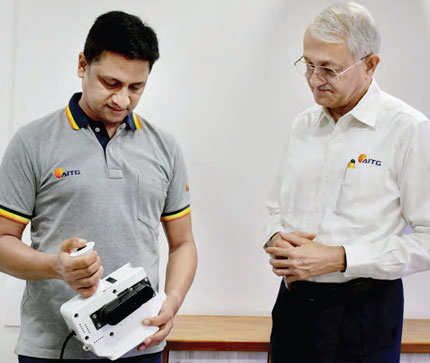
CC: It’s not easy to change businesses and not look back…
Over the years, we realised that getting emotionally involved in the business to the point that you still don’t want to leave it even if your business is down, is detrimental to any business. As an entrepreneur, you should know when to let go, and we as a family, made that decision together, to let go of the non-stick cookware business and continue our business in auto-components.
CC: Tell us more about Nirlep, which was indeed a path-breaking business.
When I joined Nirlep in 1977, the product had already become popular and it had almost a monopoly in India but that was the time also when our first competitor came in. It was also the year in which the Indian economy was facing headwinds and selling any product in India was becoming challenging. It was at this time that we built up a lot of unsold stock.
CC: How did you manage to clear the unsold stock?
There were two options to liquidate those stocks-either export them, which was not easy in those days, or sell locally. That was the time when we discovered TV commercials. Mumbai, Delhi, Chennai and Kolkata had TV networks. We started advertising 20-second commercial spots on the most popular music programme during that period—Chayageet. That was like a miracle. Whatever stock we had piled up, we sold within six weeks and we had a pent-up demand for the next year. The impact of TV commercials in those days was something that we learned through a difficult period.
CC: What other early challenges did you face at Nirlep?
We faced a drought from 1973-1976 in major parts of India. There was an acute shortage of electricity that led to an acute shortage of aluminium, which was our raw material for non-stick cookware. In Maharashtra, industries were directed to work only in the night shift. And this was at a time when my father and my uncle had developed markets for Nirlep in Arabia, down to Africa, to far-eastern countries like Malaysia, Indonesia, even Brunei. We were also exporting to Poland. Practically, we were caught in a situation where demand from these countries and India was huge but we were simply not able to produce due to restrictions, power shortage, aluminium shortage and import restrictions on aluminium. We could not even import the non-toxic paints required for non-stick cookware.
We had to struggle to overcome the shortages of electricity and aluminium but we never looked back. The demand in the country grew so much that fulfilling the export demand became practically impossible. By then, Italy, Spain and other countries in Europe had started manufacturing non-stick cookware and practically they grabbed the market that we had created.
CC: Your use of innovative technology…Please elaborate.
We also learnt to come out with technologies to overcome shortages. Unionism was also at a peak in those days. At that time, the Minimum Wages Act had just come in. Unions were very aggressive and very demanding. So, we focused on automation and semi-automation technologies to overcome union and labour issues.
We developed many other technologies to overcome shortages. Instead of depending on pure aluminium, we started using alloy aluminium. Then we developed technologies to roll our own circles (the base of the pan) by using aluminium scraps which were non-toxic in nature so there was no lead content. When the going gets tough, it teaches you to explore innovation and technologies. We developed technologies for polishing and painting utensils and created paints that were non-toxic and high heat resistant. Since import was banned until 1994, we had to migrate from one technology to another.
CC: What were the numbers you had for Nirlep in terms of production and turnover?
In 1976, we struggled to make about 100 pans a day. By the time we finished developing technologies, we used to make almost 1,50,000 pans a month. All this, with practically the same number of workers and with technologies that were indigenously developed in Aurangabad.
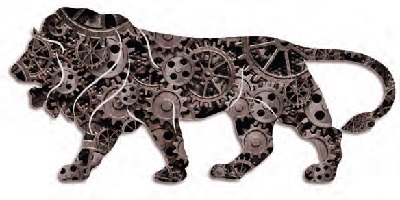
CC: Who were your competitors?
The first competitor was Trupti from Mumbai. Mr Mehta, the owner, had migrated from the USA and he started making non-stick cookware in Mumbai. The second was Delhi based Black Diamond and the third was Butterfly from Chennai. Except for Trupti and Butterfly which have emerged as major brands, others were local. After that, the first organised player to come into the market was TTK of the Prestige brand. Hawkins tried to enter the non-stick cookware but then they exited.
CC: Your views on Aurangabad as an automobile manufacturing hub…
Automobile manufacturing in Aurangabad began with Bajaj Auto setting up a plant in 1983-1984. That was done on the insistence of the then Industry Secretary Mr Bhadkamkar. While he was posted in Aurangabad, he had initiated the setting up of the Waluj industrial area. As luck would have it, after Aurangabad, he was posted at Pune, where he met Rahul Bajaj and they became friends. He later became Industry Secretary for Maharashtra. He urged Mr Rahul Bajaj to expand at Waluj. Bajaj Auto agreed to set up a plant at Waluj and that’s how Aurangabad got one major automobile industry.
That triggered a lot of component manufacturing in Aurangabad. In 1996-1997, along with Mr Gopinath Munde, some of us visited Europe as part of a government delegation where we could convince Skoda to set up an assembly plant in Aurangabad. Now it is a full-fledged plant for Volkswagen, Audi, and Skoda. Bajaj Auto may produce 1,50,000 -1,70,000 motorcycles in Chakan, Pune. They may be producing similar quantities in the North, but they also produce a similar quantity of motorcycles and 45,000 three-wheelers in Aurangabad too. Their new four-wheeler, Cute, has yet to pick up but they produce 500-700 four-wheelers in Aurangabad. Thirty-five to forty per cent of Bajaj Auto’s activities are here and they are buying a large chunk of their components from Tier-1 vendors, which has made Aurangabad a major source for auto components.
"We also learnt to come out with technologies to overcome shortages. Unionism was also at a peak in those days. At that time, the Minimum Wages Act had just come in. Unions were very aggressive and very demanding. So, we focused on automation and semi-automation technologies to overcome union and labour issues"
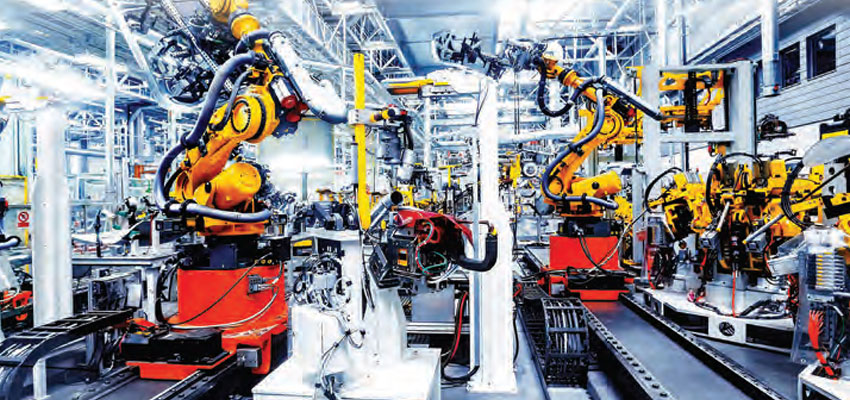
CC: What is the turnover of the entire Aurangabad MIDC today?
The net tax collection shows that industries in Aurangabad contribute about Rs.12,000 crore annually to the government kitty, which includes tax paid to the Central Government, the GST, and State Excise paid to the State Government. The numbers were higher before GST came in. That would translate to annual revenue of about Rs.150 -180 lakh crores. Recently, I saw some statistics, which indicate that Aurangabad exports are close to about Rs.15,000 crores of goods annually. That would be 10 per cent of the total revenue generated by the industry.
CC: What is your take on ‘Make in India’?
I believe that it is working. It came at a time when the world wanted to move away from China. Therefore, the Covid-19 pandemic, in a way, is a boon in disguise for India. After the Prime Minister announced Make in India, we started working on creating facilities to promote the industry. There were disruptions in the supply chain because the pandemic has created huge opportunities for ‘Make in India’. We in our business verticals are seeing tremendous growth. We make heavy machine fabrications for mining machines, excavators and road rollers. The kind of demand that we have today from the various industries across the world will help us grow three-fold within the next 12months if we set up the right facilities. All the demand was previously made to China. Now they are insisting that we should expand and we should start supplying.
"The net tax collection shows that industries in Aurangabad contribute about Rs.12,000 crore annually to the government kitty, which includes tax paid to the Central Government, the GST, and State Excise paid to the State Government. The numbers were higher before GST came in. That would translate to annual revenue of about Rs.150-180 lakh crores"
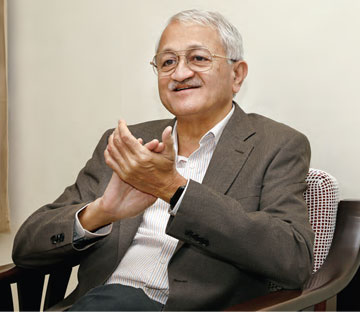
CC: So, who are these new clients?
European countries who were sourcing from China are now coming to India. This is thanks to the PM who made sure that over the last 4-5 years we talked about manufacturing in India for the world. So, it has made an impact. When people start thinking of moving from China, the first option that comes to mind is India, which otherwise would not have happened. They could have gone to Korea, or any other country. They are coming to India because of the posturing of the Government of India. And we are not the only ones. Some of my friends who are into plastic manufacturing have grown 100 per cent during the pandemic because their businesses depended on a lot of automation, like in plastic injection moulding. Where businesses depend on a lot of automation, they could quickly ramp up production easily.
CC: Do you think that the State Government has met the expectations of the automobile manufacturing units in Aurangabad? It is often said that Western Maharashtra gets more focus.
Frankly speaking, there are lopsided policies. If you study the various subsidies that are aimed at underdeveloped regions, you will find that most of the subsidies are consumed by Western Maharashtra. Be it a capital subsidy, sales tax deferral or sales tax incentives, the concessions go to that region. Even 60% of agricultural subsidy for electricity is consumed by five districts: Kolhapur, Satara, Pune, Sangli, and Nashik. We talk of farmers’ suicides in Vidarbha and Marathwada but if you look at the electricity subsidy, it is largely consumed by Western Maharashtra.
CC: It is so unjust-is the reason political?
I would not put politicians in the cage but it also has something to do with the initiative of the regions. We fought for subsidies but never fought to become bigger in manufacturing. The same thing with Vidarbha. We always depended and looked at government concessions rather than creating something of our own. I personally feel that if there is enough initiative within this region, then we can definitely overcome the lopsided subsidy policies of the government. However, the government should also do something to change the policies, but it is the law of nature that the most powerful creature takes the largest part of the kill.
CC: Your website mentions many values like integrity, compassion. Could you tell us about that?
We carried out an exercise identifying values we hold dear. We have been working on these values since the last generation but articulated them and put them in place, about eight years ago. Nirlep is something that people could touch, feel, and experience. They could identify the values associated with the brand because millions of people used it. But if you talk of components going into vehicles that are not seen by any individual, how do you tell people what values you work with? One of them is integrity—we haven’t had a court case in the last 60 years, for any breach of any law. And if ever there was any irregularity due to oversight and it was pointed out by the government, we settled the irregularity and we paid the fine if any. Even those incidences of irregularities have been once in 10 years for a small amount of Rs.50,000. Largely, we have been following all the laws applicable to us.
In the 60 years’ history of our Group, we have had only one or two cases of labour unrest and rarely have we had any issues, but now with the polarisation of the society, we find managing labour forces a major challenge with so much talk about caste and religion. Our task becomes difficult, as outside our premises, the society is thinking in one direction and you cannot make your workers think in the other direction. As far as our workers’ distress is concerned, you can talk to any of our workers, we had three generations working with us.
CC: What is your staff strength?
Combining 4-5 companies, we would have 1500 people.
"Most of the startups are in the IT-enabled sectors. What will the IT-enabled sector do without the brick and mortar economy? Brick and mortar startups are not valued at all. In fact, we should be evaluating and supporting brick and mortar economy startups more than the IT-enabled startups"
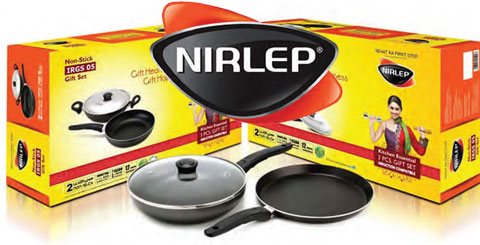 Nirlep brand was founded by Ram Bhogale’s father,
Nirlep brand was founded by Ram Bhogale’s father, Mukund Bhogale and sold to Bajaj Electricals, three years back
CC: This is the era of startups. What are your observations?
My personal point is, most of the startups are in the IT-enabled sectors. What will the IT-enabled sector do without the brick and mortar economy? Brick and mortar startups are not valued at all. In fact, we should be evaluating and supporting brick and mortar economy startups more than the IT-enabled startups. Unfortunately, IT-enabled startups keep on losing money years together and increase their valuation, whereas brick and mortar startups start earning money and are not valued at all.
We have a diploma student who developed a wonderful equipment for spraying pesticides and insecticides on the farms. It is not power pump operated which you normally get in the market. It is based on two bicycle wheels, a tank, and a pump. When you push the cart, it generates pressure inside and sprays pesticides and insecticides. A simple piece of technology developed by a student, helped by MAGIC, the incubation centre set up by the Chamber of Marathwada Industries and Agriculture. And MAGIC has helped this boy to go into commercial production, but this doesn’t get highlighted in the media.
Largely, when I talk to the new generations of startup promoters, the idea of cash burn is very common. For us and for the next generation, burning money is not an idea. In the last 10 years, we may have spent about Rs.10 crores on various products which have nothing to do with our current line of business. On the one hand, Saurabh (son) is also working on agricultural equipment, for which we must have spent Rs. 7-8 crores in the last couple of years, though it has fetched us sales of not more than Rs.20,000. We are very confident that that’s the future, because we are tapping a market that has been untapped by most of the agricultural equipment manufacturers. People like to work with farmers who have resources; we are working for farmers who have marginal resources. We are working with with farmers who have just two to three acres of land who need the help of technology but are not able to invest too much. So, most of the products that would come to the market would be in the range of Rs.2,500 to Rs 10,000.
We are working for them, but when will it translate into a real business? Now that we have some products that are tested and proven very useful, we are quite confident that in the next three years, we will create a market for ourselves. Now we are in the auto-components business, the automobile industry may face headwinds because of electrical vehicles, so we have to gear up. We are also working on other devices as well, such as a unique hearing aid which will create a text message and display it on the phone, so you need to only read it. Conventional hearing aids have a lot of issues, they do not help the user hear clearly.
CC: What are your observations about today’s young managers and engineers? You have seen four decades of youngsters working for you.
The psychology over the years has changed, because of the advent of technology and cushy jobs in IT. I am not saying that cushy jobs don’t work. I say that the environment in which they work is cushy. An engineer who is working on the shop floor where there is so much of noise, dust, and smoke will find it unglamorous as compared to sitting in an air conditioned environment and working on a PC, and getting paid three times the salary. Getting to travel to the US and Europe every month is actually creating a different picture and a desire in the minds of young engineers not to want to work on the shop floor. Most of them want to work in jobs which will offer them Rs.50,000 to start with and opportunities to migrate to the US or Europe.
The question is, can every single engineer, every single youngster get a job like that? Not possible. Somebody will have to toil in the sun and rain; somebody will have to work on the shop floor to create things. Unless people do that, the information technology business cannot survive. Somebody will have to fly the plane so that somebody can manage the ticket booking in the office. Ultimately, people will have to work on the field for all the people. Even the media creates such a hype about the salaries that are offered to IIT graduates. One crore rupees salary for a beginner, when we offer a salary of Rs.15,000 a month, to begin with. That is creating a lot of stress in the minds of the younger generation and therefore, they are not stable. They would like to migrate quickly to better pastures where they can earn more. There are hardly any opportunities for creativity in some of these sectors and the burnout would be very fast. Unfortunately, they don’t know the downside of that. They look at the picture from a distance, which is very attractive.
CC: Do you have difficulty getting people to work for you?
No. What we did was, we started to recruit from smaller towns such as Dhule, Jalgaon, Amravati, Wardha, where the students know the value of hard work and are willing to stick to jobs for
Continued: NextGen Innovation
Saurabh Bhogale, son of Ram Bhogale is involved in innovative technologies for marginal farmers
CC: (To Saurabh) Between both of you, father and son, you have a formidable challenge in terms of values and ethics. What is it like to have a family business and to have such a stalwart as your father?
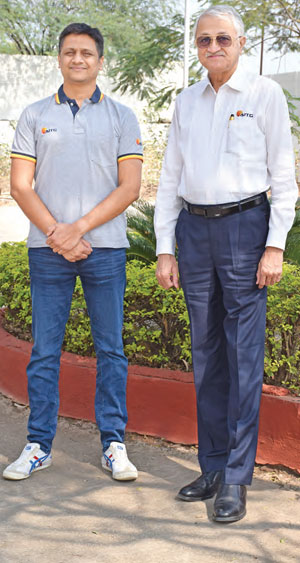 Ram Bhogale with his son Saurabh who is
Ram Bhogale with his son Saurabh who is focusing on the agricultural sector
Saurabh: It is a challenge along with the opportunity to be born in a family business. A challenge, because people will say Saurabh has got everything on a platter. He’s lucky to have a place in his family business after graduating, and then working in the family business and getting all the attention from the staff. When you enter a family business you are judged all the time. And you are compared with the earlier generation and their achievements. But opportunities are also there, because in a family business, I get the opportunity to work in the business to hone my skills. If I was in a job, and made mistakes, I might lose my job—that doesn’t happen in a family business, I am given more opportunities, that is the fortunate part of it. Then, you have the other opportunity to observe your elders, learn from them. Everybody makes mistakes, you learn from their mistakes, then you are in a better position to take a call when it comes to your table.
CC: What is your educational background, and when did you join the business?
I am a commerce graduate. I joined in 2003, worked on the shop floor for two years, then I went to the UK to do my Diploma in Manufacturing Systems. I came back from the UK in 2007. I started to work on the techniques I learned at the University, here. During that time, Bajaj Auto had started insisting that its vendors adopt a total productive maintenance policy. It is a policy where you are expected to eliminate 16 types of hidden losses. But you are incurring those losses. These can be in terms of raw material or consumables, manpower, space utilisation etc. All these losses are identified in the policy. You create a plan to eliminate the losses, that’s how you become competitive.
CC: What part of the business do you manage?
I am a director in the company and I am now involved in new product development. In the beginning, I spent most of the time in operations, administrative activities, and now I am working on new product development.
CC: What innovations in agricultural technology are you bringing in?
A few of my father’s friends who are into agriculture spoke to my father asking if it was possible to develop some products, which would resolve some of the pain points for farmers. My father took up the challenge and started the company, ‘I Invent Labs’ and we have a director coming from Mumbai, who is a technical expert. Initially, he shifted to Aurangabad for 4-5 years, helped us to establish the company and then he being a Mumbaikar, had to go back. Since then, I have been managing this company. And he is involved intermittently.
CC: What do you admire about your father, and as an entrepreneur?
As a father, I admire him for his principles, and as an entrepreneur, I admire him for his down to earth quality.
CC: What is the philosophy of life that you live by?
I am just exploring my philosophy.